Some facts about sugar
Dentists hate sugar – well that’s what everyone expects us to say – but everything in moderation, I say.
Yes, sugar is responsible for tooth decay (rotten teeth) hence I wince when I walk past a sweet shop but there are other health issues associated with sugar.
Here are some facts so you can make up your own mind…
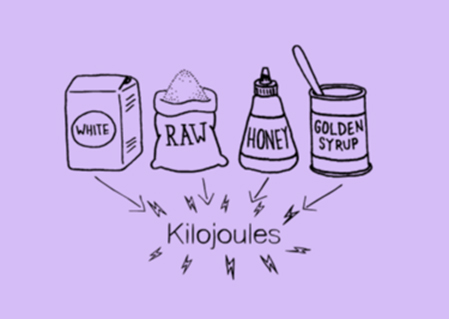
White sugar, raw sugar, honey, golden syrup… they’re all sugar products and they all pack kilojoules
There’s a huge range of sugars and sweeteners available today including white sugar, raw sugar, honey, maple syrup, agave, coconut sugar, rice malt syrup and molasses. Certain types are often promoted in the media or by celebrities as being healthier than others. However, it doesn’t matter whether the product is touted as being raw or less refined or sugar free. The bottom line is that all of these products provide energy/kilojoules and not much else in the way of nutrients (empty calories).
And while artificial/intense sweeteners such as stevia, aspartame, saccharin or sucralose often found in ‘diet’ foods and drinks do not contain kilojoules, they also do not provide any nutrients. These artificial sweeteners are far sweeter than regular sugar and may lead to a reliance on a sweet taste. The best thing to do is have as little as possible of all sugars and sweeteners.
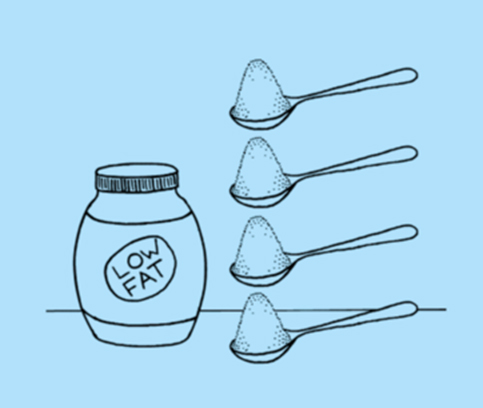
Low fat foods may actually be full of sugar
While limiting the amount of fat in your diet is good, you have to be careful you don’t end up with more sugar. Many foods, such as yoghurt, flavoured milk and peanut butter, have low fat options, but when you take the fat out of food it often means a loss of taste and different ‘mouth feel’. One way to make up for this is to add sugar. In some cases, a lot of sugar. It’s important to check the label and choose the product with the lowest amount of added sugars.
Also check the ingredient list, because sometimes manufacturers have sneaky ways to hide sugars by calling them by their other names, for example corn syrup, maltose, glucose, fructose and sucrose.
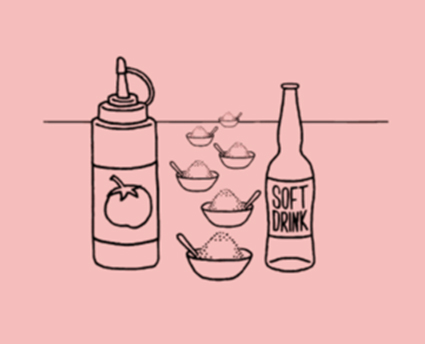
Tomato sauce has as much sugar as soft drink
We all know that soft drink is high in sugar, but you’d be amazed where else you’ll find sugar in high concentrations. Think yoghurt, pasta sauce, kids’ cereal and, yes, tomato sauce. While soft drink is up to 10% sugar, barbecue sauce and sweet chilli sauce can be loaded with up to 54% sugar.
Moral of the story: check the labels, ease up on the sauce and think about some alternatives like a veggie salsa.
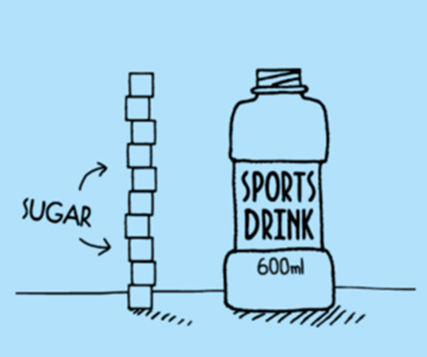
A sports drink can contain up to 10 teaspoons of sugar
An average 600mL sports drink contains over 600kJ and nearly 40g or 10 teaspoons of sugar. This can be useful to replace lost energy if you’re running a marathon or doing heavy exercise for over 60minutes. If you’re not, though, it’s just adding empty kilojoules to your day. Compare it to water, which is excellent for hydration and contains…let’s see…absolutely no kilojoules or sugar at all!
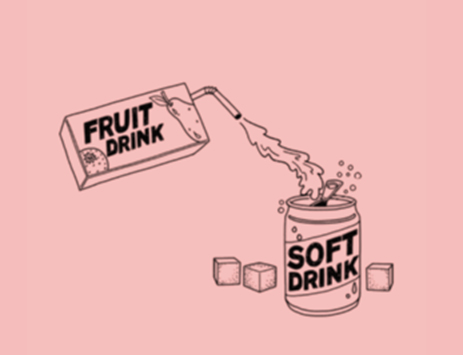
Fruit drinks can contain just as much sugar as soft drink
We know a 600ml bottle of soft drink can contain up to 16 teaspoons of sugar, but did you know fruit drinks can contain just as much? Fruit drinks are often promoted to children as a healthy option, but they may have up to 7 teaspoons of sugar in a 250ml serve, which is equivalent to the amount in a similar volume of soft drink.
Over half of Australians are consuming too much added sugars, with the average intake being about 14 teaspoons (or 60 grams) each day. This is over twice the recommendation from the World Health Organisation of approximately 6 teaspoons per day for adults. Having a diet high in added sugar can lead to excess energy intake and poor dental health in children, overweight and obesity which increase the risk of developing diseases like type 2 diabetes, cardiovascular disease and cancer.
Check the label of drinks to find those high in sugar but remember the best drink of all is plain water – cheap, accessible and good for you!
Here at Dentistry on King, Buderim we care about your teeth as well as your general health. Call us on 5445 3110 for an appointment or click here.
Article Courtesy Of Health QLD see full article and more here @ healthier.qld.gov.au







